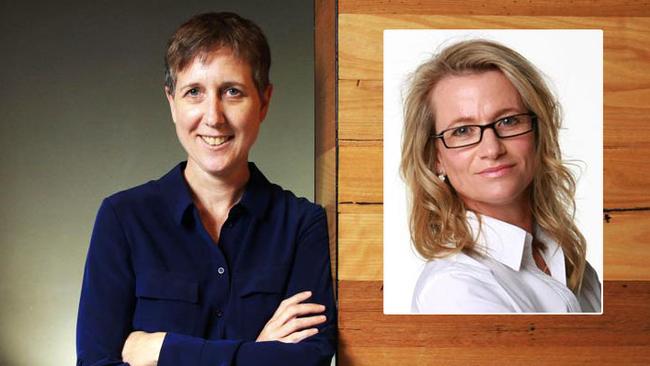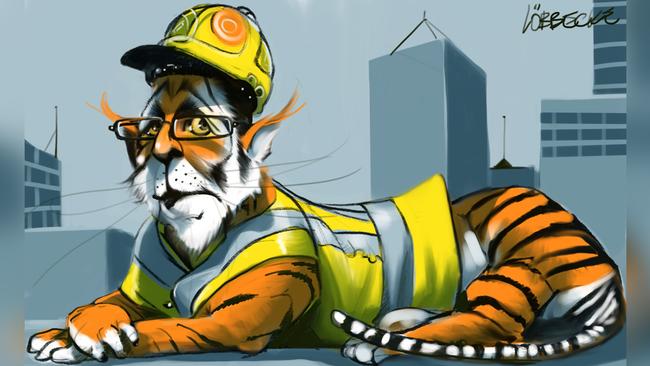
ACTU boss Sally McManus said on the ABC’s Insiders last Sunday: “It is actually the law of the jungle, and the tigers are winning.”
Oh Sally, let’s be honest. You’re the tiger. Not the big bosses that you disparage as evil Dickensian types, those rich chaps who you say have shiny yachts and throw a few crumbs to workers. You know that’s tosh. And as for the industrial relations jungle, no one on the centre-right side of politics has been game enough to seriously enter that realm since John Howard left office. That jungle is yours alone, tiger.
But I have to admit I have a slight girl-crush on McManus. Of course, our politics couldn’t be more different. Her cravings for more collectivism, more centralised power in the hands of union leaders are abhorrent to anyone who reveres individual freedom and understands that unemployment falls when the economy grows. And neither of those aims is part of McManus’s regressive agenda. She just is not a believer in growing the national pie.
That said, when authenticity is rare in Australian politics, the ACTU boss has cornered the market, outperforming the government frontbench. That makes McManus our Jeremy Corbyn. She oozes Corbyn’s class war convictions, channelling his hatred of the rich with no comprehension of basic economics.
Sure, she’s younger than him, and her Wiki page, which reads as if it has been cleansed by the KGB, fits her persona: more icy-cold Soviet Russia than warm Cuba. Yet still the unsmiling McManus has the earnestness of Corbyn. Given few in Britain expected his success as a left-wing populist, she might be a potent political leader here one day.
McManus is compelling enough right now, taking the union movement on to the field of industrial relations reform, playing hard even without an adversary. And when there’s only one team on the field, it wins by default. The sooner the Liberals realise this, the sooner they might re-enter that arena.
At the moment, play is going Sally’s way. Yesterday at Melbourne Town Hall, the ACTU held a “change the rules” rally, part of a campaign to demand new industrial relations laws giving unions even more power. No shrinking violet, McManus is a regular on ABC radio and television. She performed her greatest hits at the National Press Club last month and repeated that rendition on Insiders.

Her appearance on the ABC’s Q&A in February was a tour de force. Up against three solid proponents of facts and reason — James Pearson from the Australian Chamber of Commerce and Industry, businesswoman Heather Ridout and Chris Richardson from Deloitte Access Economics — McManus dominated the evening with her collection of classic hits of emotional assertions devoid of supporting facts. Not even a trio of fact-checkers could neutralise McManus’s scary ability to sound as if she is the voice of reason when she’s not.
Just as the Turnbull government took too long to see the potency of Labor’s “Mediscare” campaign, it hasn’t worked out that McManus packs a punch. If it did, it would be vigilant in battling every absurd claim she makes every time she makes it, instead of occasional pea-shooting retorts.
Her most constant and captivating claims don’t stand up to the facts. McManus told her Q&A audience that “profits are up at 20 per cent and wages are at 2 per cent. There’s something wrong. It’s not being shared fairly at the moment.”
Something is certainly wrong with that: her grasp of facts. Australian Bureau of Statistics data shows that business profits rose 5 per cent in the year to December and the total wage bill rose 4.8 per cent. And basic economics tells you that wages head up when unemployment, now at 5.5 per cent, heads down, and unemployment falls when businesses grow.
Another McManus classic hit is that productivity has risen while wages haven’t. It sounds dreadfully unfair. Except that’s not true either. According to the ABS, in real terms, consumer wages have risen 54 per cent during the past 25 years and productivity rose 51 per cent in the same period.
Insecure work is spreading, says McManus, deliberately using an emotional term not measured by any one set of statistics. If McManus means casual work is on the up, the Productivity Commission found that the percentage of casual workers, at 21 per cent, hasn’t changed for two decades. If McManus means contractors are in insecure work, that empty claim is exposed by the real world of Uber and hundreds of thousands in the modern economy who choose the flexibility and freedom of contracting over nine-to-five permanent jobs.
McManus’s class-war rhetoric about big companies is intoxicating politics, but it’s entirely bogus too. She says big companies such as Qantas, BHP and Boeing “earn billions but pay no tax”.
As ABC economics guru Emma Alberici was recently reminded, companies pay company tax on profits after paying all their expenses. And far from the wild claim that big companies are ripping us off, it’s likelier to be workers dudding the system. Tax commissioner Chris Jordan has said many times now that “the work-related expenses gap is estimated to be greater than the large corporate tax gap of $2.5 billion”.
But you have to hand it to McManus. Any mention of a corporate tax cut elicits masterful “trickle down” imagery from McManus. She talks of rich blokes who are “so incredibly rich, people like us can’t even imagine how much money they’ve got” and they decide “to throw a few crumbs to their workers”.
No mention that tax cuts grow companies, creating jobs. Or that that almost 60 per cent of small business owners who would benefit from a corporate tax cut earn $50,000 or less, well below the median award wage.
Equally spurious is her claim that “the basic right to strike in Australia is very nearly dead”. The right to strike is in the Fair Work Act, enacted by Labor. Nothing has changed.
That brings us to the real fraud at the core of the ACTU’s change the rules campaign. The ACTU boss started saying the “system is broken” when a decision by the Fair Work Commission went against a union. Don’t agree with the umpire? Scream about a broken system. The system is broken, but not in the way that McManus claims. Fewer workers are covered by enterprise agreements, down from 1.2 million in 2010 to just over 500,000 last year, because EAs are complex to negotiate and inflexible in practice. More workers fall under the convoluted system of awards, not replicated by any other developed economy.
McManus’s prescriptions of more powerful unions, industry-wide pay claims and strike action, a “living wage” paid by goodness knows who, higher taxes for companies and so on would be a disaster for economic growth, unemployment and sustainable wage rises.
It’s bad enough that her influence is bolstered by unions bankrolling the Labor Party, now in poll position to win the next election. It’s even worse that the Liberals have emboldened her. There is no contest of ideas from the Liberals, no fight to reform workplace laws for the 21st century, let alone to tackle her wild claims of a jungle ruled by evil bosses with the same passion.
It’s true that the Business Council of Australia, led by Jennifer Westacott, has stepped up to the plate. But right now, McManus is a tiger, and it’s not just down to her convictions. It’s because a supine and silent government amplifies her roar.




